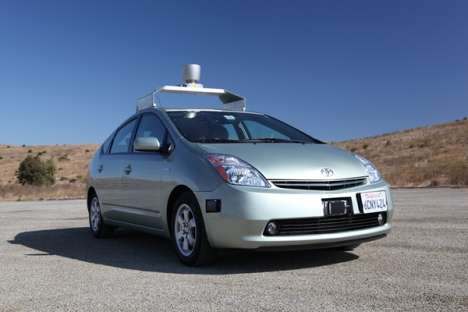October 11, 2015 weblog
Rear-ending drivers add up in DMV self-driving accident reports

The first thoughts expressed when the world learned that Google was experimenting with driverless cars included a fair share of OMGs. What if the cars went haywire, and how often could they go haywire, and would that not pose a danger to human drivers on the road?
Google's self-driving contingent were quite clear in their response: The car was going to be of benefit to aging and visually impaired people who would not have to give up their independence. The biggest benefit, a most significant one, is that deaths from traffic accidents—over 1.2 million worldwide every year—could be reduced dramatically, given that 94 percent of accidents in the U.S. involve human error.
In July the Google driverless car program's Chris Urmson did a Q&A session. (Before Google, he was on the faculty of the Robotics Institute at Carnegie Mellon; his research focused on perception for robotic vehicles.).
The question was that there were lots of articles about accidents involving the cars and were those signs that the cars are unsafe? His reply: "In six years, over the course of 1.8 million miles of autonomous and manual driving, we've been involved in 15 minor fender-benders. The self-driving car was never the cause. And except for the most recent incident, where some minor whiplash was reported, there haven't been any injuries. Instead, given that we were rear-ended in 11 of those 15 incidents, the cause seems to be distracted drivers who aren't watching the road."
The Atlantic staff writer Adrienne LaFrance recently offered an assessment that what we face in the next chapter of driverless cars is more complex than a clearcut yes or no on danger. When self-driving cars first appear on roads, the safety picture may be nuanced.
She wrote that "while driverless cars may end up saving millions of lives around the world this century, the period before automated vehicles make up the vast majority of cars on the road might be confusing, for humans and computers alike."
She discussed why. "Some researchers believe safety will actually worsen during this time—at least for the people in cars driven by humans. This isn't just because humans are worse drivers than computers—and, certainly, they are—but because humans will be forced to navigate a vehicular environment that lacks many of the cues we use now to get around."
Natasha Lomas of TechCrunch similarly commented. "Earlier this year," she wrote recently, "Google blogged about the 11 'minor accidents' its driverless cars had been involved in over six years of testing—laying the blame for all 11 incidents at the hands of the other human drivers. Which sounds great for the technology on the surface. But in reality it underlines the inherent complexities of blending two very different styles of driving—and suggests that robot cars might actually be too cautious and careful."
On Friday, Gizmodo said that the California DMV had published driverless car accident reports online (of traffic accidents involving an autonomous vehicle) with human error to blame.
The reports covered the period from last October to this year, almost a year's worth. But there's more to say: Yes, there was human error but, as Kate Knibbs in Gizmodo pointed out, driverless cars may sometimes be overly cautious. "Abruptly stopping is what computers do when they sense a threat, while human drivers may simply accelerate around the corner," said Knibbs. "And people used to driving alongside other people aren't necessarily prepared for the abundance of caution used by automated drivers."
The question remains if driverless cars are too good to coexist with human drivers on the road? Lomas explained: "Autonomous vehicles navigating open roads guided only by algorithmic smarts is certainly an impressive technical achievement. But successfully integrating such driverless vehicles into the organic, reactive chaos of (for now) human-motorist dominated roads will be an even more impressive achievement—and we're not there yet."
© 2015 Tech Xplore




















